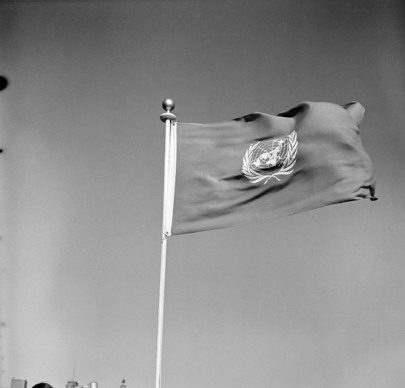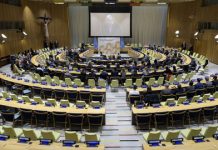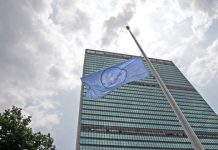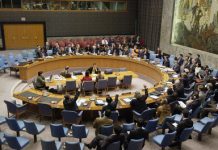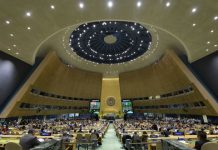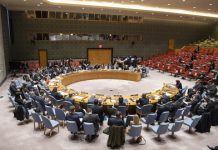Bangladesh protests probe reveals top leaders led brutal repression
The repression of mass protests in Bangladesh last year that toppled the country’s prime minister left as many as 1,400 people dead in just 46 days; the vast majority were shot by security forces, UN human rights chief Volker Türk said on Wednesday.
In addition to those killed, thousands were injured, including one youngster who was shot in the hand at point-blank range for throwing stones, according to a report into the violence by the Office of the High Commissioner.
The protests were triggered by the High Court’s decision to reinstate a deeply unpopular quota system in public service jobs. But broader grievances were already entrenched, linked to “destructive and corrupt politics and governance” the UN human rights office report maintained.
Here’s the UN rights chief speaking in Geneva now:
“There are reasonable grounds to believe that officials of the former government, its security and intelligence apparatus, together with violent elements associated with the former ruling party, committed serious and systematic human rights violations. These include hundreds of extrajudicial killings, extensive arbitrary arrest and detention, and torture and ill-treatment, including of children, as well as gender-based violence.”
As many as 12 to 13 per cent of those killed in the protests were children, according to the UN human rights office report. Bangladesh Police also reported that 44 of its officers were killed between 1 July and 15 August 2024.
13 Palestinian children killed in West Bank violence so far this year: UNICEF
To the occupied West Bank, where conflict-related violence has continued to claim the lives of civilians, including women and children, UN humanitarians have warned.
The development comes after a 10-year-old Palestinian boy died from his wounds after reportedly being shot on 7 February.
The UN Children’s Fund, UNICEF, said two days later, in Nur Shams camp, a heavily pregnant woman was reportedly shot and killed.
The agency’s Regional Director for the Middle East and North Africa, Edouard Beigbeder, expressed deep concern at the rising number of child casualties in the occupied West Bank.
He said that in the first two months of this year, 13 Palestinian children have been killed in the West Bank.
This includes seven since 19 January, amid the Israeli military’s large-scale operation in the north of the occupied territory.
In Gaza, meanwhile, the UN aid coordination office, OCHA, reported on Wednesday that more than 2,300 children have been treated for acute malnutrition since 1 January.
Of the 2,369 children admitted for treatment, eight in 10 were suffering from moderate acute malnutrition, and two in 10 have been diagnosed with severe acute malnutrition.
So far this month, 360 patients including 156 children have been medically evacuated from Gaza. About 5,000 children remain in urgent need of hospital care outside the war-torn enclave.
New childhood cancer meds platform is ‘a beacon of hope’ for families, says WHO
A new UN-partnered plan to distribute childhood cancer medicines has begun in Uzbekistan and Mongolia; the pilot platform will initially benefit four more countries too, the World Health Organization (WHO) has said.
Around 400,000 children are diagnosed with cancer every year and most of them live in low-income countries where medicines are either unaffordable or unavailable, resulting in an overwhelming 70 per cent death rate.
In high-income countries, more than eight in 10 children who are diagnosed survive.
Dr. Andre Ilbawi, Technical Lead of the WHO cancer control programme, told journalists that “the platform is now set to close this gap” in care for children who get sick.
“The first set of countries are now receiving medicines through the Global Platform for Access to Childhood Cancer Medicines This marks the beginning of a global movement to provide children with cancer the medicines that they need, regardless of where they live, or their ability to pay”
The UN agency’s goal – working with leading US paediatric facility St. Jude Children’s Research Hospital – is to reach 50 countries where needs are greatest, providing medicines to treat 120,000 children with cancer in the next five to seven years.
The launch of the platform has been made possible by a $200 million investment by St. Jude’s – marking the largest financial commitment ever made for childhood cancer medicines globally.
Daniel Johnson, UN News.
Source of original article: United Nations (news.un.org). Photo credit: UN. The content of this article does not necessarily reflect the views or opinion of Global Diaspora News (www.globaldiasporanews.com).
To submit your press release: (https://www.globaldiasporanews.com/pr).
To advertise on Global Diaspora News: (www.globaldiasporanews.com/ads).
Sign up to Global Diaspora News newsletter (https://www.globaldiasporanews.com/newsletter/) to start receiving updates and opportunities directly in your email inbox for free.


